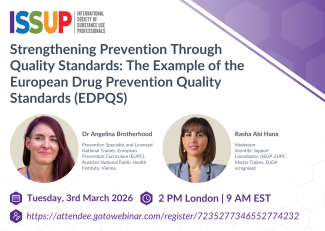Ramalho, R., Volfová, A., Lososová, A., Folch-Sanchéz, D., Braddick, F., Seabra, P., Chaudhary, N. I., Choudhury, S., Geert, D., Ghosh, A., Cruz, D., Hasanović, A., Ignjatova, L., Kepa, K., Kiburi, S. K., Jerkovic, D., Lamsal, P., Okulicz-Kozaryn, K., Rafei, P., Sadruddin, M. M., … Kurcevič, E. (2025). Developing a holistic and inclusive competency framework for the
addiction workforce: Insights from a transdisciplinary team of addiction professionals. Adiktologie, 25(1), pp–pp.
